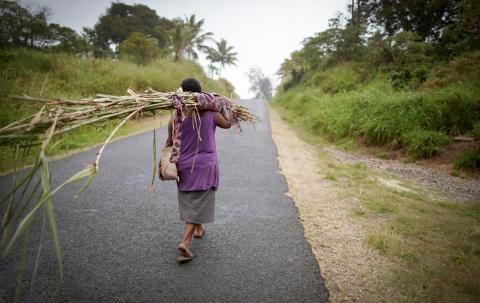The World Bank’s new report, The Gains and Pains of Working Away from Home, makes the extraordinary claim that migrant workers and their communities experience “net positive” social outcomes from Pacific labour mobility schemes that split up families. The report draws on findings from the first wave of the Pacific Labour Mobility Study (PLMS) – an “omnibus” survey funded by the Australian Department of Foreign Affairs and Trade and jointly administered by the World Bank and the Development Policy Centre at the Australian National University. The PLMS boasts an impressive sample size – encompassing 2085 workers, 2010 migrant households, and 2231 non-migrant households from Kiribati, Tonga and Vanuatu – but offers limited insight into the complex social issues that scaffold the Pacific Australia Labour Mobility (PALM) scheme and New Zealand’s Recognised Seasonal Employer (RSE) scheme.
The main problem with the report’s rosy conclusions about family separation and worker welfare stems from the underlying data and the methods through which they were obtained. Simple surveys with predefined responses have a valuable place in some areas of labour mobility research, but don’t typically offer reliable insights into deeply personal and subjective topics, such as the strength of intimate relationships or the nuance of working conditions, particularly where the respondent may perceive the enumerator to represent an authority figure or their disclosures as having potential bearing on employment circumstances. As one worker made clear at last month’s Pacific Labour Mobility Annual Meeting (PLMAM) in Port Vila, where the report was launched, “I may say there’s no situation, but that doesn’t mean there’s no situation.”
While accompanying welfare teams making site visits during the early days of Australia’s Pacific Labour Scheme, I saw first-hand how workers can be reluctant to speak up under these circumstances. Several years researching the social impacts of the PALM scheme have underscored the importance of establishing trust and building rapport with participants to encourage open discussion about sensitive topics, ideally using culturally attuned methods that foreground workers’ knowledge and allow them to guide the discussion. It has equally shown that such research must be designed and validated in consultation with Pacific researchers and stakeholders, who alone have genuine expertise about how knowledge is appropriately produced and shared in these contexts.
Phone surveys designed without the input of experienced social researchers, intermediated by private survey firms, and carried out by a large team of contracted enumerators, fall worryingly short of meeting the threshold for contextually sensitive or culturally appropriate data collection on complex social issues.
These shortcomings are reflected in the report’s key findings. On the one hand, income earning opportunities for PALM workers were found to be substantial. With workers recording average post-tax incomes of around AU$40,000 a year, wage differentials with home countries ranged from three times the national average in Tonga to ten times in Vanuatu. Deductions and high remittance costs erode some of these gains, but the study reaffirms the strong economic motivations that underpin participation in Pacific labour mobility schemes. The reported “gains” of labour mobility are, however, not limited to income. In stark contrast to other studies, the report finds overwhelmingly positive feedback on worker wellbeing and satisfaction with employment, as well as benefits for families. More than 80% of participants reported positive outcomes for parental relationships and more than 60% for marital relationships, while negative implications were recorded as 7% and 24%, respectively. Notably, no difference was found between seasonal workers and those participating in the PALM Long scheme – where workers are separated from families for periods of up to four years. Absence makes the heart grow fonder, the authors apparently conclude, observing that “if anything, they [PALM Long participants] are less likely to report negative impacts on their marriage”.
These headline findings were presented before a PLMAM audience of nearly 400 Pacific labour mobility stakeholders. To say they were met with scepticism would be an understatement. Not only did the report seemingly dismiss as “misperceptions” the findings of numerous comprehensive studies detailing pervasive social issues, its claims clashed jarringly with the expertise of those at the coalface of labour mobility. High commissioners and ambassadors rebuked the report for misrepresenting welfare problems encountered on a routine basis, agents spoke of visiting workers struggling in overcrowded accommodation, and community stakeholders at both ends of the scheme described the breadth of challenges faced by workers and families.
Most importantly, a presentation given by workers themselves detailed in no uncertain terms the social costs they experienced: specifying problems with poor housing and lack of privacy, difficulty accessing healthcare, insufficient support services, and the detrimental links between familial relationship issues and psychosocial wellbeing.
Using reductive survey data to lay claim to the “facts” of labour mobility outcomes is a concerning proposition. Policymakers in Canberra might be receptive to these stylised findings, but their Pacific counterparts are seemingly not – if PLMAM is anything to go by – and this disconnect between “evidence” and actual experience can only harm the credibility of labour mobility schemes. If Australia is serious about treating our Pacific neighbours with dignity, this must extend to the ways in which we gather, share and value knowledge. Rather than dismissing mounting evidence of social harms as “anecdotal”, we should leverage the plurality of expertise within labour mobility research to take these concerns seriously. Most crucially, we must learn to listen, and ensure that Pacific and Timorese voices are heard above all others.


